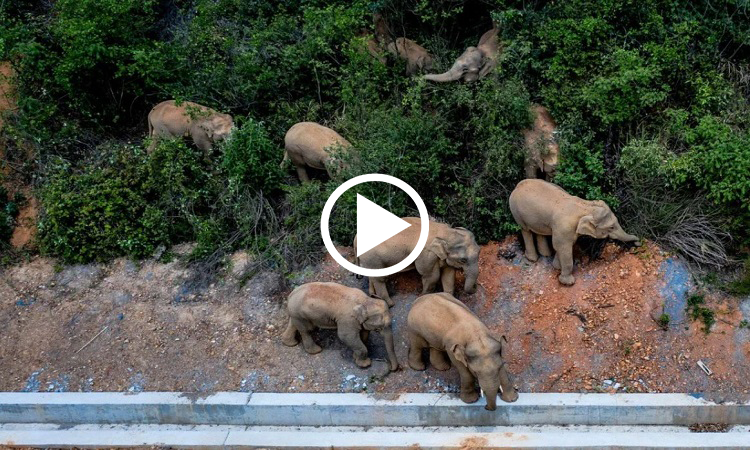The elephants traveled hundreds of kilometers for six months to the capital of Yunnan province, Kunming.
In December 2020, a herd of 15 elephants, including female elephants and calves, left their habitat in the jungle of Pu’er city, southwest China’s Yunnan province and began to move north. After 400 km, they continued on and were within 100 km of the capital of Yunnan province, Kunming, a distance that an adult elephant can travel in a day.
Along the way, herds of elephants wandered through villages and towns, along highways and highways, ignoring the sirens of police cars. Residents watched the scene from a safe distance and the media kept track of the elephants’ route, the distance they traveled and their last location.
Wildlife experts don’t know why the herd decided to move. Every herd of elephants is different, some more adventurous than others. It is possible that these elephants developed an instinct to wander through the vast territories where their ancestors once lived and that they feel safe despite being surrounded by humans.
But researcher Becky Shu Chen said elephants can become fearful, influenced by pressure. Chen is originally from Kunming and works for the Zoological Society of London. She has been studying interactions between humans and elephants in Yunnan since 2012. According to her, the last migration of Chinese elephants was around 400 years ago, when the elephants traveled from the Yunnan forest to the source of Yangtze River water, thousands of kilometers to the north.
The number of wild Asian elephants in China is only 1% of the global total, or around 300, and their habitat is limited to the southernmost region of Yunnan, including Xishuangbanna, Lam Thuong, and Pu Er. The area has experienced rapid urbanization and the elephant’s original habitat has shrunk, fragmented between forests interspersed with roads, villages, towns and fields. Currently, the remaining forest and elephant populations are strictly protected.
According to Chen, Chinese elephants are adapting to the new landscape and the elephant population is increasing. They are also less afraid of people and prefer farmland to the jungle. “Elephants don’t really feel threatened by humans now. They love delicious food but consume up to 200 kg of food per day. In the forest, they have to travel long distances to find wild plants and not have more nutrients than crops. like corn. In the fields, elephants don’t spend a lot of time and energy finding food, ”Chen explained.
Part of the reason elephants head to Kunming is because they don’t care about streets, highways and other public places, the researcher explains. Asian elephants are not exactly forest species and prefer open spaces. Because they are not afraid of humans, elephants can expand their range to find food and territory.
The elephant herd’s journey in Yunnan may have started as a foraging expedition. Whatever the cause, they always surprise when they start their journey to Pu’er. The foresters shared a herd of elephants crossing the Mo River, which they had never done before.
The elephants did not return to their old home, but continued north, reaching Nguyen Giang district in April 2021. After a few days, they reached Thachping district, and on May 25, the elephants were in the Nga Son district south of Kunming. This is not the first time that wild elephants from Yunnan have moved. They often infiltrate towns and villages. Two years ago, an elephant crossed the border into Laos and returned to China a few hours later.


